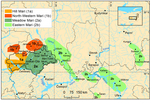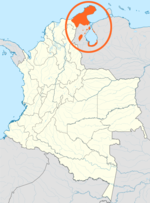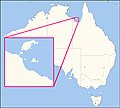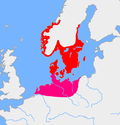process of morphological derivation. Desiderative mood is a kind of volitive mood. In Sanskrit, the desiderative is formed through the suffixing of /sa/...
7 KB (322 words) - 06:25, 28 October 2024
imperative mood (emir kipi), the necessitative mood (gereklilik kipi), the optative mood (istek kipi), desiderative mood (dilek kipi), conditional mood (şart...
91 KB (9,951 words) - 09:08, 22 October 2024
superset of the cohortative mood and is closely related to the subjunctive mood but is distinct from the desiderative mood. English has no morphological...
16 KB (2,082 words) - 18:32, 6 October 2024
mile, you will see it". Whereas the optative expresses hopes, the desiderative mood expresses wishes and desires. Desires are what we want to be the case;...
31 KB (2,811 words) - 03:01, 23 October 2024
particle まで (made) acts like a terminative case. Cessative aspect Desiderative mood List of grammatical cases Anhava, Jaakko (2015). "Criteria For Case...
5 KB (568 words) - 23:41, 20 September 2023
element' and TAM 'tense–aspect–mood element' (also NG number–gender, PN person–number, TA tense–aspect, TAME tense–aspect–mood–evidential) etc. These are...
151 KB (3,514 words) - 06:04, 7 November 2024
past tense, volition, passive voice, causation, imperative and conditional mood, and ability. There are also special forms for conjunction with other verbs...
129 KB (6,447 words) - 05:11, 16 September 2024
Volitive modality (redirect from Volitive mood)
moods are a category of grammatical moods that are used to express volitive modality. Examples are the optative, desiderative and imprecative moods....
3 KB (349 words) - 20:39, 10 March 2024
Proto-Indo-European verbs (section (h₁)se-desiderative)
iterative/inceptive ("I did something repeatedly"/"I began to do something"), desiderative ("I want to do something"). The formation of secondary verbs remained...
82 KB (7,772 words) - 15:18, 23 August 2024
Mari language (section Mood)
existing in more grammatical tenses and moods. It has its own form in the present indicative, imperative and desiderative, and in the first preterite indicative...
48 KB (3,689 words) - 01:21, 23 October 2024
imperfective -iraa, and the desiderative -ee. For example, from the root kache ("hang"), one can derive the desiderative a-kache-r-ee-waa "to want to...
20 KB (1,990 words) - 10:32, 25 October 2024
past suffixes) conditional-conjunctive (-ińd́eŕa-v(V)ĺ + past suffixes) desiderative (-ikseĺ + past suffixes) optative (zo + present suffixes) imperative...
32 KB (1,723 words) - 21:03, 3 August 2024
Misantla Totonac (section Mood)
Distributive /-kuhu/ - Completive /t͡sa̰a̰-/ - Preceding/Just /saa-/ - Desiderative /-nan/ - Become X /as-/ - Interrogative Nouns may be inflected for number...
19 KB (2,231 words) - 06:20, 13 April 2024
subject. There are three moods: indicative, imperative and desiderative. There is a further distinction within the imperative mood between imperative and...
10 KB (932 words) - 02:01, 11 August 2024
Guarani dialects (section Desiderative inflection)
specifically in third person or plural morphemes. The morpheme for desiderative inflection, ‘ta-’. As in the other examples mentioned prior, this morpheme...
44 KB (4,418 words) - 02:44, 23 September 2024
(continuous, immediate); tense (past, present, future) and mood (imperative, desiderative, interrogative). For example: Past -nábé Future -nátu' dubitative...
15 KB (1,615 words) - 07:30, 15 October 2024
*h₁ést). Secondly, the desiderative suffix of *-s-/-so- became the future suffix in Proto-Italic. The subjunctive of this desiderative-future, with a suffix...
85 KB (4,538 words) - 07:49, 21 September 2024
Panará language (section Mood)
ablative case, adessive, allative, comitative, comitative-locative, desiderative, essive, final, inessive, instrumental comitative case, instrumental...
22 KB (1,878 words) - 11:02, 5 January 2024
Udmurt grammar (section Desiderative)
(preterite II, third person singular) with a personal possessive suffix. The desiderative modal expresses desire. The verb потынын, 'to want' is inflected in the...
87 KB (3,978 words) - 17:54, 10 January 2024
special perfect endings. The periphrastic perfect is used with causative, desiderative, denominative and roots with prosodic long anlauted vowel (except a/ā)...
32 KB (2,836 words) - 07:10, 22 October 2024
Furthermore, Sanskrit has so-called Secondary conjugations: Passive Intensive Desiderative Causative Denominative The non-finite forms are: Participles Infinitive...
55 KB (4,728 words) - 10:55, 26 October 2024
Hurrian language (section Indicative mood)
The potential form is also occasionally used to express a wish. The desiderative form is used to express an urgent request. It is also only found in the...
81 KB (6,312 words) - 15:43, 12 October 2024
Urartian language (section Mood marking)
example of its use is alu-šə tu-l-(e)yə "whoever destroys it". 3. A desiderative, which may express the wish of either the speaker or the agent, is expressed...
46 KB (5,773 words) - 23:10, 4 November 2024
the s-future. It is a descendant of the Proto-Indo-European (h₁)se-desiderative, with i-reduplication in many verbs. The Old Irish a- and s-future come...
84 KB (5,182 words) - 01:14, 1 November 2024
Furthermore, Sanskrit has so-called Secondary conjugations: Passive Intensive Desiderative Causative Denominative The non-finite forms are: Participles Infinitive...
48 KB (4,549 words) - 10:23, 7 November 2024
obstruent. 'N' stands for a homorganic nasal. #The comitative, purposive, desiderative, ablative, and aversive suffixes are preceded by -bah on animate nouns...
19 KB (1,534 words) - 23:04, 18 October 2024
There are three declensions, the main (non-possessive), possessive and desiderative declensions, and seven cases in Enets: the nominative, genitive, accusative...
33 KB (2,687 words) - 17:46, 8 September 2024
The future tense was probably rendered using the subjunctive mood and/or with desiderative verbs. Other tenses were derived in the history of the individual...
60 KB (6,134 words) - 13:31, 2 November 2024
dependent event, which often leads in purpose, desiderative and manipulative clauses to the use of moods that cannot be used in independent clauses. Small...
6 KB (812 words) - 12:35, 28 July 2024
example, the Greek future uses a -s- ending, apparently derived from a desiderative construction that in PIE was part of the system of derivational morphology...
130 KB (12,136 words) - 16:54, 29 October 2024












